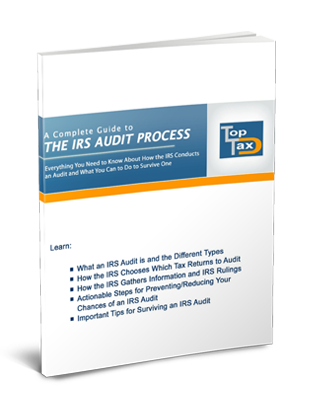IRS revenue officers are trained government employees that specialize in the collection of back taxes. If you owe back taxes, you will likely become familiar with the revenue officer in your region that is assigned to your case.
When you work with Top Tax Defenders, a personal tax professional will deal with the IRS revenue officer so you don't have to. Watch Top Tax Defenders CEO Jayson Mullin explain more.
What is the difference between a Revenue Agent and a Revenue Officer?
While there may be some overlap in the duties of tax revenue agents and tax revenue officers, the key distinction lies in their primary focus: tax revenue agents typically focus on conducting audits and examinations, while tax revenue officers primarily focus on enforcing tax laws through collection activities and enforcement actions against delinquent taxpayers. However, the specific roles and responsibilities of these positions can vary depending on the policies and procedures of the tax authority employing them. Here's a general overview of their typical responsibilities:
Tax Revenue Agent:
- A tax revenue agent is usually employed by the Internal Revenue Service (IRS) and has specialized knowledge in tax law and accounting principles to effectively carry out their duties.
- Tax revenue agents are typically involved in conducting audits, investigations, and examinations of taxpayers' financial records to ensure compliance with tax laws and regulations.
- They may be responsible for examining tax returns, conducting interviews with taxpayers and their representatives, analyzing financial data, and making determinations regarding tax liabilities.
Tax Revenue Officer:
- A tax revenue officer is also typically employed by a tax authority and is involved in enforcing tax laws and regulations.
- However, tax revenue officers may focus more on collection activities, such as assessing and collecting delinquent taxes, securing tax liens or levies on property, and working with taxpayers to establish payment plans.
- They may engage in communication with delinquent taxpayers, conduct investigations into taxpayers' financial situations to determine their ability to pay.
- IRS revenue officers have the authority to take enforcement actions when necessary to recover unpaid taxes, such as sending notices, issuing levies and liens, making collection calls, and visiting your home or place of work.
- If you already have a lien or levy on your property, revenue officers have the right to seize your property after appropriate notice.
- Tax revenue officers may also work to educate taxpayers about their tax obligations and assist them in resolving tax-related issues.
- The goal of an IRS revenue officer is to force the taxpayer into compliance, meaning that all back taxes are filed, and taxes owed (plus assessed penalties) are paid in full.
- The job of the revenue officer is to attempt to get the taxpayer to pay their taxes in full instead of settling for a lesser amount.
Tips for Dealing with IRS Revenue Officers
Dealing with an IRS revenue officer requires preparation and strategy. First, it's crucial to understand your rights and obligations under tax law. Respond promptly to any communications from the revenue officer and provide requested information accurately. Maintain clear and respectful communication throughout the process, and consider seeking professional assistance from a tax professional to navigate complex tax issues. Be proactive in resolving any outstanding tax liabilities by cooperating with the revenue officer and exploring options for payment arrangements or settlement agreements. Lastly, document all interactions with the revenue officer and keep detailed records of financial transactions to support your case.
How to Differentiate an Revenue Officer from a Tax Scammer
One common scam involves scammers calling and pretending to be an IRS agent. They give a fake badge number and demand urgent and immediate payment by gift card or wire transfer of taxes they say you owe, while threatening things like arrest, suspension of drivers license, or other aggressive action.
To avoid becoming a victim of a tax scam, you should remember that the IRS will typically contact you by mail through the US Postal Service. Occasionally, they will call a home or business, but they will not demand immediate payment by wire transfer or threaten you. You should be very wary of sharing personal information through links that come in email or text or over the phone. Don't give in to fear or panic that scammers will use to get you to share information or give them money.
Consulting reputable tax professionals can also help you avoid becoming a victim of a tax scam. If you're unsure, your tax pro can help you find out whether there is a legitimate issue with your return.
What Tax Revenue Officers Can and Cannot Do
Remember the main job of a tax revenue officer is to collect fully on unpaid tax debts. The IRS allows its revenue officers ample latitude when collecting money from taxpayers. These officers have authority to collect debts through means like:
- Sending out notices via the mail
- Making phone calls to delinquent taxpayers
- Visiting tax debtors at home or at work
- Issuing mandatory summons to appear at local IRS tax offices
- Issue levies against assets like your wages and bank accounts
- Seizing other applicable property at your home or business
Despite having broad authority to collect on people's obligations to the IRS, these officers also are limited in several key ways. If a revenue officer becomes involved in your case, you should realize that this person cannot:
- Arrest you for not paying your taxes
- Demand entry to your home or business by showing you a badge. The officer's official identification is a plastic card, not a badge.
- Initiate first-time contact with you through any means other than an in-person meeting
- Threaten you with arrest or violence for unpaid taxes
You also should realize that most revenue officers do not carry a gun and are typically respectful and courteous people, especially if you reciprocate that same kindness and courtesy. You can always contact the IRS or your local law enforcement agency if you believe that the revenue officer working your case is being hostile or threatening to you.
If you have been contacted by an IRS revenue office, you should seriously consider hiring a tax firm to help you navigate the process of dealing with a revenue officer. The team at Top Tax Defenders has decades of experience in dealing both with revenue officers and with the IRS and can help you make sense of your situation and understand your options going forward. The Top Tax Defenders team will give you a layer of experienced tax professionals between you and the IRS revenue officer. Instead of having the officer dealing directly with you, possibly at your home or place of business, hiring Top Tax Defenders to represent you means that the officer will have to go through them instead dealing directly with you.




